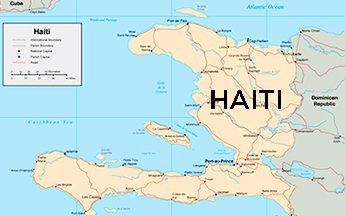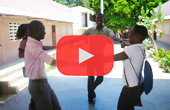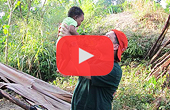A UM researcher pens a book about the history and legacy of laws against the Vodou religion in Haiti.
It was 1996, and Kate Ramsey, a then-Columbia University Ph.D. student, had just arrived in Port-au-Prince, Haiti to start her dissertation research on the mid-20th century history of that island nation. The focus of her thesis would change, however, after she read a series of documents that piqued her curiosity.
While studying works by Haiti-based sociologists and historians, Ramsey learned about the Haitian Penal Code laws prohibiting the practice of the Vodou religion from 1835 to 1987. She not only wanted to know why such laws were promulgated in the first place, but why they remained on the books for more than 150 years despite not being strictly enforced.

Kate Ramsey is an associate professor of history at the University of Miami.
“It had a much larger scope in the end than I expected to begin with,” Ramsey says of her research.
Fifteen years after Ramsey began her work on the Haitian penal regime against Vodou from the mid-19th to mid-20th centuries, her efforts would culminate in the book The Spirits and the Law: Vodou and Power in Haiti (University of Chicago Press, 2011).
With a 2013 Haitian Studies Association Book Prize, 2011 Berkshire Book Prize, and a 2011-12 Elsa Goveia Book Prize from the Association of Caribbean Historians to its credit, Ramsey’s manuscript focuses on the history and legacy of laws against the Vodou religion in Haiti, starting off by examining the Colonial roots of those laws in the French colony of Saint-Domingue.
“This is when slaveholders began to see the ritual practices of those they enslaved as a potentially dangerous empowering force,” says Ramsey, now an associate professor of history in the University of Miami’s College of Arts and Sciences.
Her book concentrates mostly on a post-revolutionary Haiti, examining the history of anti-Vodou laws leading up to the 1987 constitution that repealed the last sanctions forbidding the religion.
In The Spirits and the Law, Ramsey contends that 19th Century governments relied on these laws to counter foreign charges that “civilization” was declining in post-revolutionary Haiti and to contain or co-opt potentially empowering local forms of organization and leadership.
The early stages of Ramsey’s research were laborious. With no living sources from the 19th century, she had to rely on archival records of that era to find answers. “There were very important and significant 19th-century Haiti-based historians who did write to some extent about social movements, and certainly there were writings about those times when these laws were strictly and in some cases violently enforced. So there were records around that,” says Ramsey. “But in terms of the 19th century, it was a very archival-based research.”
It wasn’t until Ramsey began to focus on the 1930s and ’40s that she was able to talk with living sources who could provide eyewitness accounts of what it was like in Haiti at that time. One of those sources was a Vodou priest—in his 80s at the time Ramsey spoke with him—who recalled the extent to which laws against the Vodou religion were enforced in Haiti during the U.S. occupation of the island nation from 1915 to 1934.
She calls the research for her book the most meaningful and important of her career thus far.
“For me it was very important to be there and not rush in, head to the archives, then take off again,” she says. “I think the project evolved because I was there talking to people, deepening my understanding of the language, the history, culture, and society.”



